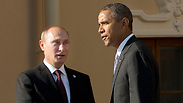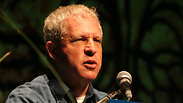
Putin and Obama. 'In the past decade Russia has grown stronger and the US has grown weaker'
Photo: Reuters

Major-General (res.) Giora Eiland
Photo: Ofer Amram
In the growing conflict
between the United States and Russia, the latter appears to have the upper hand. This stems not only from Putin's
resolve versus Obama's
hesitance, but from something deeper: The American refusal, a decade ago, to recognize the change Russia experienced in its abilities and interests.
Exactly 10 years ago, when I served as head of the National Security Council, I visited Russia. I met with all the government leaders at the time (some of them, like Foreign Minister Lavrov, are still in the same position). The Russians made sure to explain to me in simple yet unusually sharp words that Russia of 2004 is not the Soviet Union driven by the power of a communist ideology or Yeltsin's confused Russia of 1991. The new Russia's ideology is based on recognizing its growing economic power thanks to its huge oil and gas treasures.
When it comes to Russia, the Americans are "stuck" in concepts of the communist Soviet Union, and moreover – they are still taking pleasure in its collapse in the early 1990s.
US vs. Russia
Efraim Halevy
Op-ed: US president must envy his Russian rival for respect he receives in Israel as opposed to daily dose of scorn and alienation served to our 'ally.'
Russia (and in fact Putin) have three clear interests. The first interest is to maintain the government's stability, and therefore there is no and there will be no tolerance on his part towards public American criticism on issues like the lack of democratization and inappropriate actions in Chechnya, etc.
Secondly, Russia sees the former USSR countries as its courtyard, and will therefore oppose any American activity trying to drag these countries into the NATO alliance, and will definitely oppose American attempts to encourage these countries to confront Russia.
Thirdly, Russia sees itself as a world power and expects the US to treat it as one. Beyond that, Russia has no great inspirations. It doesn't have much interest in Africa, in South America, in the tension between India and Pakistan or in the Israeli-Palestinian conflict.
Limited ambitions
My hosts in Moscow said at the time that the Americans were refusing to recognize and respect Russia's limited ambitions. I asked how that was possible. After all, the US national security advisor at the time was Condoleezza Rice, an expert on the USSR, whose PhD was about the issue. "That's precisely the problem," replied Ivanov, head of the Russian Security Council. "She thinks that we are still the Soviet Union, and we're definitely not."In any event, the Russians tried to reach understandings with the Americans on many issues for a decade, including issues which the two powers have shared interests on, like the war on Islamic terror and even the Iranian nukes (Russia doesn’t want Iran to have a nuclear bomb either). The Americans refused, insisting on confronting Putin exactly on the three issues he regards as most sensitive.
There are many ramifications to the erroneous American approach. Some of them concern us directly, like the Iranian race towards a bomb (the Russians made a very good suggestion for dealing with this issue in as early as 2004, but the Americans refused to even hear them out).
The bottom line is that in the past decade Russia has grown stronger and the US has grown weaker. In 2004, Russia had big aspirations but was still relatively weak. That was the exact time to strike a comprehensive deal which could have served both sides (as well as Israel). Now Putin can dictate moves in Syria, on Iran and in the Crimea peninsula, and the Americans are finding it difficult to cope.















